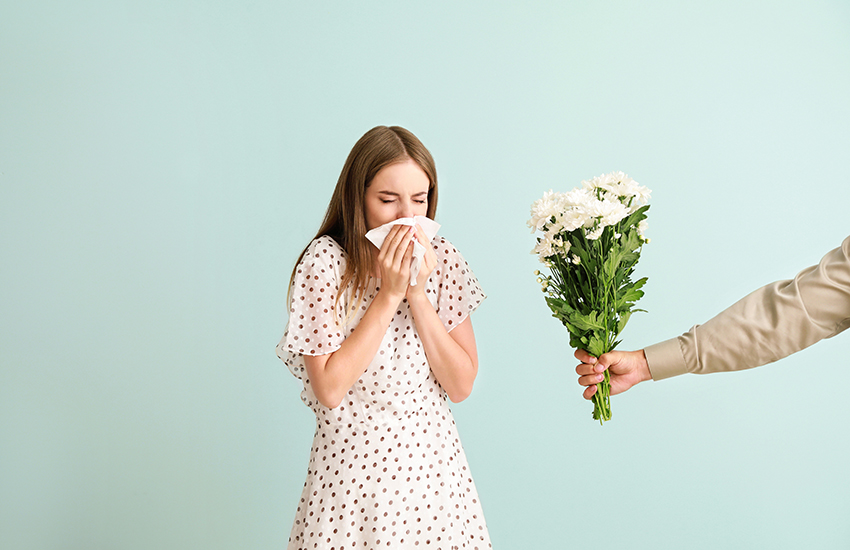Why our customers prefer Blue Cross
- Option of getting insured without a medical exam
- Excellent rates
- Pioneer in the field of health insurance with over 80 years of experience
- Friendly service from experienced agents who can answer your questions and assist you when needed
- Coverage that can be customized to meet your specific needs
- Discounts and savings with our one-of-a-kind Blue Advantage program

What Causes Summer Allergies?
Published on: April 13, 2021
Spring is a time when the trees come back to life and flowers start to bloom, but for some this time is also synonymous with sneezing, sniffling and watery eyes. Find out what causes seasonal allergies and how to prevent them.
Seasonal allergies: What are they?
Seasonal allergies—also known as hay fever or seasonal rhinitis—is a type of allergy that occurs at the same time each year and is caused by outdoor allergens. They are distinct from perennial or annual allergies, which are present all year and which are generally caused by indoor allergens such as dust mites, mould or animals.
If you suffer from seasonal allergies, you are not alone: it’s estimated that approximately 20 to 25% of Canadians have them!
What causes seasonal allergies?
Seasonal allergies are common from spring to fall and are mainly caused by pollen from certain plants.
- From March to June, pollen from trees and shrubs wreaks havoc on allergy sufferers. The main culprits ae: maple, birch, willow, ash, pine and oak.
- From May to October, it’s the pollen from grass, such as lawns and hay, which contribute.
- From July to October, ragweed, also known under the lovely term Ambrosia, releases its pollen. It’s one of the most common allergens in people with seasonal allergies. It can even cause allergic reactions in urban areas.
People with allergies should note that skin contact with poison ivy can cause itching, redness and even irritation. If contact occurs, consult a health care practitioner for appropriate treatment.
Seasonal allergy symptoms
The effects of seasonal allergies vary with each person and the causes of their allergies. The most common symptoms are:
- Worsening of asthma
- Nasal congestion
- Itching
- Clear and profuse nasal discharge
- Sneezing
- Headache
- Tingling or itching of the nose, eyes, throat or ears
- Signs of conjunctivitis (watery eyes, swelling of the eyelids, etc.)
These symptoms may be similar to other respiratory conditions such as the common cold, the flu or even COVID-19. It’s very important to pay attention to your condition and get tested for COVID-19 if you have symptoms.
These allergies can also cause side effects such as fatigue, irritability, difficulty concentrating and sleeping problems. In more serious cases, they can lead to complications such as asthma or recurrent sinusitis. Which is why it’s recommended that you seek immediate medical attention if you have severe symptoms.
How to reduce seasonal allergy symptoms
Here are some tips to help you prevent your allergic reactions and enjoy the return of the nice weather.
- Wearing sunglasses. In addition to protecting your eyes from the sun, they can act as a barrier against pollen.
- Drying clothes inside. Line drying laundry can pick up pollen from the air. Consider drying clothes inside during peak times.
- Closing the windows. At home or in the car, close the windows and turn on the air conditioner. If possible, recirculate the air.
- Yard maintenance. Keep the grass short. If your symptoms are severe, have someone else mow the lawn for you. Also, be sure to carefully remove poison ivy from your yard before it releases pollen.
- Reviewing landscaping. If possible, eliminate the substances that cause your allergies from your environment, of course using safe methods.
- Consulting pollen forecasts. This index calculates pollen count, which helps target days when it’s best to stay indoors. Pollen count is generally highest in the morning and on hot, dry and windy days.
- Washing your fruits and vegetables. Fruits and vegetables should be rinsed thoroughly before eating them. Pollen could be found on the skin of these foods, which could cause itchiness on the tongue, mouth or lips in people with allergies.
- Washing and changing clothes when getting home because pollen in the air can be deposited on the skin, clothing and hair.
Seasonal allergy treatment
Medical treatment may be required to help you return to a normal life. There are a number of over-the-counter or prescription medications available to relieve congestion, eye symptoms, itching and respiratory symptoms.
Talk to your doctor or pharmacist if you think you need antihistamines or other treatments to reduce your allergy symptoms. A visit to the allergist may be necessary to help you determine the substances that are causing your allergies and as a result help you better manage avoiding them.
Immunotherapy, which involves exposing yourself to allergens until the immune system can tolerate them, may be an option to consider if you are among the eligible patients. Your allergist can give you all the necessary information about immunotherapy treatments.
***
Allergy sufferers require patience and courage! Remember that allergies travel and you might feel the effects when you are away from home as well.
If you are travelling outside of your province of residence this summer, be sure to purchase travel insurance to cover you in the event of a medical emergency. Travel insurance from Québec Blue Cross® helps you cover medical expenses that are not reimbursed by the RAMQ and gives you access to a 24/7 assistance service to obtain all the support you need in the event of a problem.
https://www.quebec.ca/sante/problemes-de-sante/a-z/rhinite-saisonniere-rhume-des-foins/#c4515 https://acaai.org/allergies/seasonal-allergies https://www.canalvie.com/sante-beaute/sante/index-des-maladies/allergies-saisonnieres-1.1042983 https://www.jeancoutu.com/sante/conseils-sante/allergies-saisonnieres-reconnaitre-et-diminuer-les-symptomes/ https://www.familiprix.com/fr/articles/quand-printemps-rime-avec-allergies-saisonnieres https://asthma.ca/get-help/allergies-and-asthma/managing-allergies/ https://allerg.qc.ca/Information_allergique/2_4_immunotherapie.html#:~:text=L'immunoth%C3%A9rapie,'asthme%20et%2Fou%20rhinite.Sources
Updated April 13, 2021.